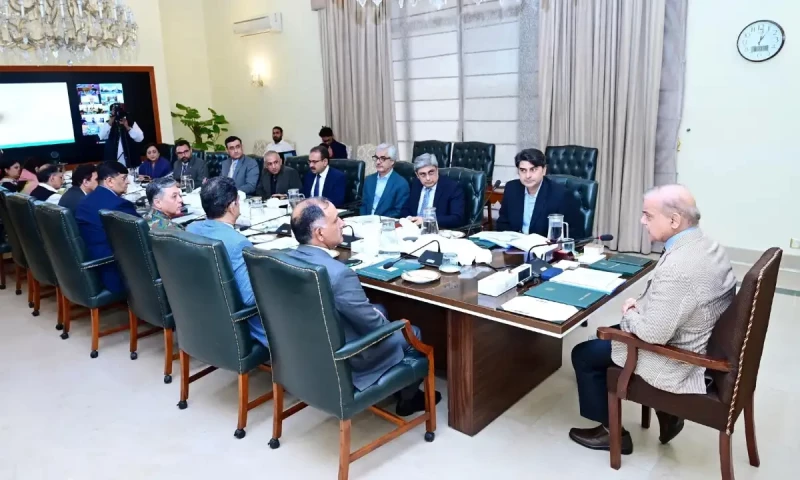Mpox Screening
Prime Minister Shehbaz Sharif has emphasized the need for heightened vigilance against the spread of the mpox virus, following the World Health Organization’s (WHO) declaration of the outbreak as a “public health emergency of international concern.”
Chairing a meeting on Saturday to review the measures being taken to control the virus, the prime minister underscored the importance of stringent screening procedures at all entry points into the country, including airports, seaports, and borders. He directed the border health services to maintain full surveillance and remain on high alert.
During the meeting, PM Shehbaz instructed the National Command and Operations Center (NCOC) to stay vigilant, conduct daily evaluations of the situation, and ensure that all necessary equipment and diagnostic kits are available for the effective monitoring and control of the mpox virus.
He also called for enhanced coordination among the regions of Gilgit-Baltistan, Azad Jammu and Kashmir, and other provinces, stressing the importance of a unified approach.
Additionally, the prime minister suggested launching a comprehensive awareness campaign to educate the public about the virus and hinted at receiving weekly briefings to stay informed about the evolving situation.
Officials attending the meeting reported that a case of mpox had been confirmed in the Mardan district, where a resident who had recently returned to Pakistan from abroad was diagnosed with the virus.
The affected individual has been quarantined, and their condition is reported to be stable and “out of danger.” Importantly, no local transmission of mpox has been detected in Pakistan thus far.
In a related development, Dr. Malik Mukhtar Ahmad Bharath, the prime minister’s coordinator on health, announced at a press conference in Islamabad that Pakistan has ramped up surveillance and screening efforts at all points of entry, including airports, to prevent the spread of the mpox virus.
He reassured the public that there is no cause for alarm, as only one case of mpox has been reported in the country.
Dr. Bharath highlighted the government’s comprehensive strategy to protect the population from the virus and emphasized that laboratories have been designated in various provinces, including the federal capital, for the diagnosis of mpox.
Dr. Bharath further explained that the new variant of the virus, which has been identified as a global concern due to its increased transmissibility, was first reported in Africa and has since been detected in other parts of the world, including Sweden.
As a precautionary measure, individuals arriving in Pakistan from Africa, the Americas, and Gulf countries are being closely monitored.
He advised the public to remain cautious, especially if they have a travel history or are experiencing symptoms, and to consult a qualified doctor for guidance.
The Sindh Health Department has also taken proactive steps to address the mpox threat by deploying a dedicated team at the airport to screen passengers arriving from abroad. Dr. Zafar Mehdi, the Sindh focal person for mpox, confirmed that screening of international travelers is ongoing according to advisory guidelines, with no suspected cases reported at Karachi airport so far.
The department has also stationed doctors and additional staff at the airport, provided over 150 diagnostic kits, and equipped the team with ambulances to ensure swift response in case any passenger exhibits symptoms of the disease.
If necessary, patients will be quarantined at NIPA Hospital, which has prepared a dedicated isolation ward.
Through these coordinated efforts, Pakistan aims to effectively manage and contain the potential spread of the mpox virus while keeping the public informed and protected.
I am a dynamic professional, specializing in Peace and Conflict Studies, Conflict Management and Resolution, and International Relations. My expertise is particularly focused on South Asian Conflicts and the intricacies of the Indian Ocean and Asia Pacific Politics. With my skills as a Content Writer, I serve as a bridge between academia and the public, translating complex global issues into accessible narratives. My passion for fostering understanding and cooperation on the national and international stage drives me to make meaningful contributions to peace and global discourse.










